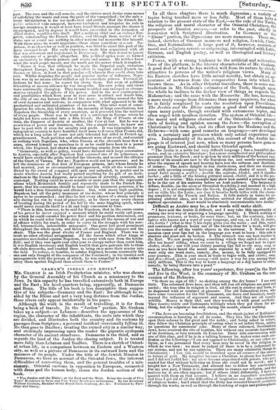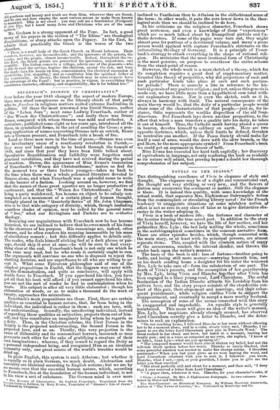GRAHAM'S JORDAN AND RHINE" MR. GRAHAM is an Irish Presbyterian
minister, who was chosen by the general Assembly of his Church as a missionary to the Jews. In this capacity he has travelled extensively both in Europe and the East ; his head-quarters being, apparently, at Damascus aud Bonn. The title of his book is less descriptive than sug,ges- tive Of his subjects—Germany and the East; for although he re- sided by the Rhine and not a very long distance from the Jordan, those rivers only appear incidentally in his pages. Although the work is the result of travelling, it is far from being a book of travels. In the "Jordan" portion, Mr. Graham takes up a subject--as Lebanon—describes t le appearance of the region, the character of the inhabitants, the sects into which they are divided, and illustrates both the country and its customs by passages from Scripture; a personal incident occasionally falling in. ne then goes to Baalbec ; treating the ruined city in a similar way, and strikingly impressing upon the reader the gigantic cyclopean oharacter of its ancient structures. Damascus is the third, and as regards the land of the Jordan the closing subject. It is treated ;uore fully than Lebanon and Baalbec. There is a sketch of Orient- al urban life, in a comparison between an Eastern and a Western city, as well as a picture of Damascus in its outward form and the manners of its people. Under the title of the Jewish Mission in Damascus, we have an account of the Oriental Jews, the inherent difficulties of convertin,, them, and the general troubles'of a
Oriental customs cuseoms in opposition to European, connected with dress and the human body, closes the Jordan section of the book. ;
• TheJordan and the Rhine; or the East and the West. Being the result or Five Years Residence in Syria and live leers Residence in Germany. By.the Reverend 'William Graham, Member of the Royal Academy, Re. Re. Published by Part- ridge and Oakey. In all these chapters there is much digression; a variety of topies being touched more or less fully. Most of them have a relation to the present state of the East,—as the rule of the Turks the religious and moral character of the Oriental Christians, the' prospects of Russian success,—or refer to the past, chiefly ia connexion with Scriptural illustration. In Germany or the "Rhine" portion, the (111;re:stuns are more numerous. There are indeed, sketches of German manners and religion, Jewish, Chris_ tian, and Rationalistic. A large part of it, however, consists of moral and religious reverie or outpouring, intermingled with Latin, German, and English poetry, as well as theological and literary criticism.
Power, with a strong tendency to the artificial and reiterative force of the platform, is the literary characteristic of Mr. Graham. A good deal of what he has written will from its nature be chiefly attractive to persons of the writer's religious views. Many of his Eastern sketches have little actual novelty, but obtain an up. pearanee of newness from the comparative form into which he throws them. As in other Oriental travellers, there is some con- tradiction in Mr. Graham's estimates of the Turk, though upon the whole he inclines to the darker view of things as regards the Mahometan; and the same with the Muscovite. He has, however, a more ready escape from dilemmas than many inquirers' for when he is fairly nonplused he casts the resolution upon Providence. 21e Jordan and aw Mine contains a good deal of information upon many points, though overlaid with extraneous topics, and often urged with needless iteration. The system of Oriental life— the moral and religious character of the Orientals—the present state of feeling and opinion among the Jews—the corruption of Christianity in the East, amid its effect upon the Moslems and the Hebrews—with some good- remarks on languages—are developed with a certainty and precision which only actual experience can give. Independently of its merit, this account of the Arabic lan- guage is of interest just now, when so many persons have gone or are going Eastward, and should have Oriental speech. " The Arabic is a noble but vei y difficult language ; has a beautiful cha- racter, and an extensive literature ; has a more complicated and philosophical grammar than the Greek ; and is spoken by sixty millions of the human race. Several arils swag are new to the European ear, and nearly unattainable after the organs of speech and hearing has-cleat the softness and flexibility of infancy. The:Arabs delight in fine distinctions, and their ear discrimi- nates with unerring accuracy between, the slightest shades of sound. The spund halek means a walker ; double the aspirate, hhalek, and it signifies barber ; add a little of the hissing guttural sound, Match, and it is the pro- sier word for-creators This example hulas show how careful a preacher ought to be in the use of his aspirates before an Arab audience. The language is diffuse, flexible, (in the sense of Shemitish flexibility,) and musical in a high degree ; it is not composite like the Greeks English, and German ; it moves not on stilts like the,Latin ; nor does it breathe forth trifles With the charm- ing simplicity of the French and Italian, Itfailsinainly in terms for ex- pressing abstract ideas, and is therefore Unfitted for idealism and philo- sophical speculation. Kant would be absolutely untranslatable into Arabic."
Difficult as Arabic may be, a few words will make shift.
"I have-said the Arabic is difficult, and I may take thiaopportunity of stating the best way of acquiring a language speedily. 1, Think nothing of grammars, lexicons, or books, for some time; but, on the contrary, take a native who knows not a word of your language, and say, as I did, in Arabic, shu hatha? (what is that ?) his reply gives you the name ; and this, varied and Continued eighteen hours out of the twenty-four for a Week, will give you the names of all the visible objects in the universe. 2. Never on any occasion open your lips but in the language you want to learn : this rule is absolute and must not be broken. 3. The stomach was our best teacher iii the East. We saw people eating something which they called chubez, and after ten hours' riding, when we come to a village we forget not to repeat disk:4 ehubez ; nor will your thirsty panting lips fail to cry moy, meg, In soon as you have-heard the sound once repeated by a well; and now you want only one wordsmore, namely, flue, money, to be fully equipped for your-journeys :This is your stock in trade to begin with, and eltub, may, andfias —bees/A seater, and money—will make a way for_ you among these sixty millions, This is the way to learn a language as a dog learns to swim, namely, by being thrown into a pond."
The following, after ten years' experience, five years:in the East and five in the West, is the summary of Mr. Graham on the con- version of the Hebrews.
"Is there no sign of life? no shaking among the dry bones? I see very little. The reformed Jews hear, and then tell you all religions are good and useful ; the true idea in religion is (lod, all the rest is nimbus and form, to be dispensed with or retained at pleasure. The old Talmudical Jews, who have some veneration for the Old Testament, are fierce and fanatical, nearly beyond the influence of argument and reason. And they are all equally worldly. Money is their idol, and they worship it with great assiduity. They receive tracts and Testaments willingly when they get them for no- thing, but the colporteur has sold, during the month, almost nothing.
* * * *
. "The Jews are becoming freethinkers, and the strait-jacket of Rabbinical ceremonialism is bursting at all its seams. They live like the Christians; open their saloons to the greatand the noble ; -and being asked in return, they follow the Christian principle of eating what is set before them, asking no questions for. conscience' sake. Many of these reformed, freethinking Jews, have received the rite of baptism, but without any accurate knowlixige of its doctrines, or love towards its Founder. Enter into conversation with one of this class, and if he is in a talking humour he makes some such con- fession as the following—'I am not opposed to Christianity, or any other re- ligion, as I am persuaded. that every man may be saved in the religion Ui which he was born: we must' be judged (if there is to be a judgment) by our actions, and not by our opinions. There are many admirable things in Christianity : 1 Cor. xiii. should be inscribed upon all corners of the streets in letters of gold, My daughter became a Christian to please her husband, and I did,not forbid her : my niece became acquainted with priests, who per- suaded her that Without believing on Jesus she could not be saved, and I bought her a New-Testament, -and allowed her to,follow -her convictions. For my own part, I think it is dishonourable to change our religion, and the motives for it are often impure ;- but if others think differently, I hav no quarrel with them on that account. I believe in no, immediate revelation, and thus I get rid of all the difficulties of inspiration and the contradictions of-religious books;- but I admit that the Deity has revealed himself me ta through his works, as well as through the teaching of sages and philosophers. All goodness and beauty and truth are from Rim, wherever they are found, and he can and does employ the most various means to make them known to mankind. This is my creed : you may call me a freethinker (Freigeist) if you litre, but I know many Jews and Christians who are of the same
opinion. ' Mr. Graham is a strong opponent of the Pope. In fact, a good many of his papers in the section of "The Rhine" are theological disquisitions, or sharp attacks upon the Papacy. In the East, he admits that practically the Greek is the worse of the two churches.
"There is a small body of the Greek Church on Mount Lebanon. Their numbers, however, arc inconsiderable, and the ignorance of the priests, the monks, and the people, almost inconceivable. Indeed, throughout the en- tire East, the Greek priests are proverbial for ignorance, impudence, and stupidity. The bishop comes to a village, selects one of the peasants—who is able to read the service, baptize the children, anoint the sick, and bury the dead—lays his hands on him, communicates the electrical succession of apostolicity, (viz. stupidity,) and so constitutes him the spiritual father of the community. In theory, the Greek Church may in some respects have the advantage of the Papal ; but in practice, in vigour, in everything that constitutes character, efficiency, and respectability, she is far behind her."



























 Previous page
Previous page